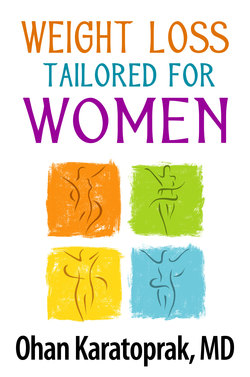Читать книгу Weight Loss Tailored for Women - Ohan Karatoprak MD - Страница 9
CHAPTER 4 MENOPAUSE FACTORS RELATED TO EXCESS BODY FAT AND FAT LOSS
ОглавлениеMenopause is a stage of life where hormonal changes usually occur, in particular changes of the sex hormone, estrogen. But other hormonal changes can occur that contribute to changing body composition and can be harmful to health, as illustrated in Figure 1, for example increased cortisol and aldosterone, and decreased levels of Vitamin D, DHEA, and Growth Hormone. These hormonal changes can cause your body to accumulate excess body fat, and reduce muscle, bone, and other lean body mass tissues. They can also make you more susceptible to diseases, such as cardiovascular diseases and osteoporosis.
As part of a body fat reduction and weight management program, it is important to be aware that the hormonal changes associated with menopause can therefore complicate a fat loss program, even when a person is following the personalized Body-Profile Type Nutrition and Exercise programs. So, after 3 weeks of following the Body-Profile Type Fat Loss Program, if you are not losing body fat and are in the menopause age group (as discussed below), this indicates that the hormonal imbalances may be interfering with the ability to lose body fat.
The following information presents an overview of the main hormones related to Menopause.
HORMONES
Hormonal changes that occur during aging also enhance the accumulation of body fat, reduction of FFM (Fat Free Mass or lean body mass), and energy balance. Environment and behavioral abnormalities causes a cascade of hormonal changes. Hormonal changes coming from aging and behavioral abnormalities have the same effect, causing:
Excessive fat gain
Reduction of Fat Free Mass
Hormone Changes with Aging
Aging is associated with decreased Growth Hormone, Testosterone, 17 B-Estradiol, DHEA, Melatonin, as well as decreased responsiveness to thyroid hormone and resistance to leptin and insulin. The importance of hormone balance when it comes to aging management and the quest for a long and healthy life cannot be overstated. The following Figure, Hormone Changes with Aging, summaries these hormonal changes. In addition to the health implications, for people who are trying to reduce their excess body fat content, imbalances in these hormones may present another challenge, in addition to the other hormones, such as leptin, ghrelin, and adiponectin. Therefore, for people who are 40 years of age and older, if you find that your fat loss progress is slow while following the recommended nutrition, supplements, and exercise programs based on your Body-Profile Type Evaluation, then it may be necessary to discuss with your doctor the possibility of some medical intervention to help to restore the levels of one or more of these hormones that naturally declined with aging, with the exception of cortisol, which would need to be reduced if found to be higher than normal.
